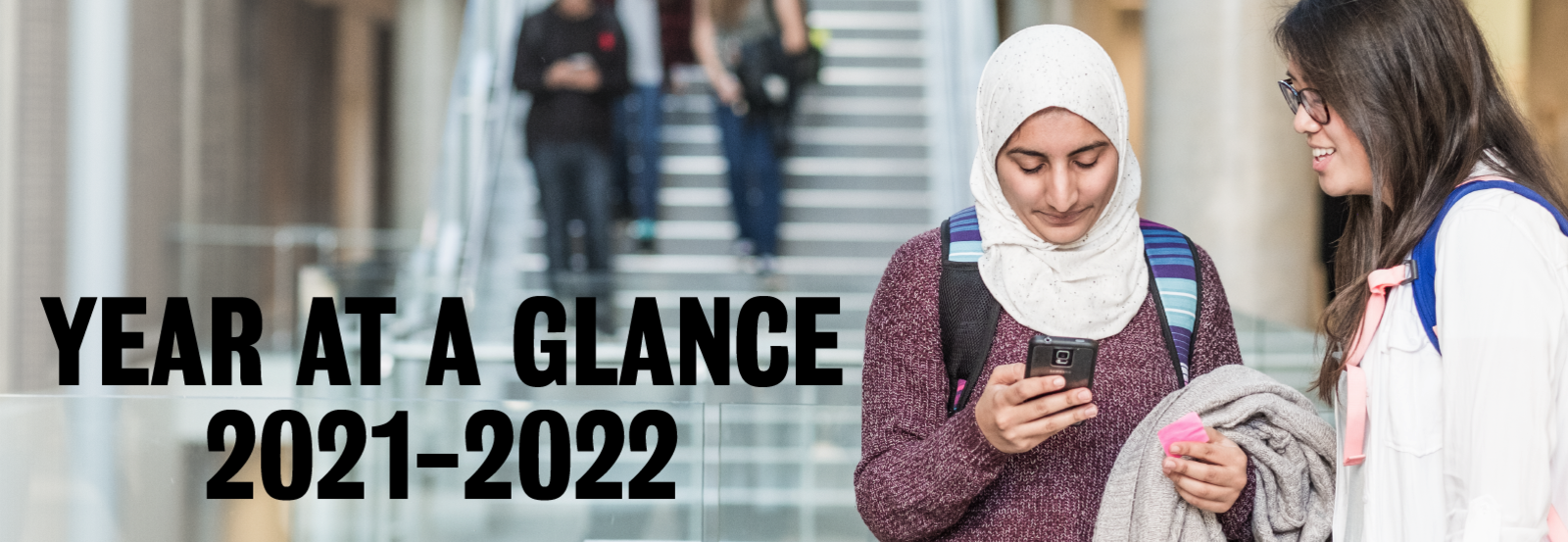The path to success looks different for everyone —the Student Success Office (SSO) is here to help each Warrior find the route that is best for them.
We aspire to create an inclusive and welcoming campus culture where every student has the tools they need to succeed. To make this vision a reality, we provide services and supports that promote students' connections with the campus community and foster their academic development while also building collaborative and intentional relationships with University staff and faculty who play a vital role in creating positive learning environments at Waterloo.
If 2020/2021 was the year we pivoted our programs and services in response to COVID-19, 2021/2022 only further illustrated the need to continue adapting. In response to rapidly changing COVID-19 policies, we were agile in our delivery of international student supports; we prepared students for success by refining existing virtual transition programs and creating opportunities for student exchange despite frequent changes in government advice; we prioritized building connections within our campus community to overcome the limits of virtual environments; and we continued to champion and advance the SSO’s commitment to anti-racism and equity within our unit and beyond. Our unit’s dedication to student success and collaborative work is evident not only in our knowledge sharing and mobilization efforts, but in all of our collective accomplishments in the past year.
This Year at a Glance report is a glimpse into the SSO’s impact from May 2021 to April 2022.
Supporting international students

Supporting international students
COVID-19 created unique challenges and uncertainty for international students as a result of travel restrictions, vaccine requirements for entry, access to approved vaccines, and quarantine requirements. For the second year in a row, many international students were forced to begin their first year of studies in their home country or outside of Canada. These challenges not only limited international students’ ability to enter Canada for their studies and gain Canadian experiences, but also prevented them from building meaningful, in-person connections to the campus community.
To combat these challenges, we continued our collaborative work with Campus Wellness, Conference Management, and Information, Systems and Technology to deliver the International Student Arrival Plan, navigated immigration and travel regulations to support inbound exchange students arriving for the first time since 2019, and facilitated community building events, both in-person and online.
In 2022-2023, we will deepen our understanding of the international student community at Waterloo by leveraging data and other new strategies for engaging students and solicit their direct feedback. This work will further uncover what gaps exist in our programming and services and ultimately help us adapt our offerings to establish a sustainable and supportive environment that is worthy of our students.
Preparing students for success

Preparing students for success
Every student deserves to thrive—both at university, and in life. Getting them there is our priority.
To empower students to start their studies with confidence, we refined Waterloo Ready modules, streamlined email communications, and responded to student feedback to improve peer mentorship opportunities. The SSO also assumed responsibility for Waterloo Grad Ready for fall 2021, a termly transition program for incoming graduate students.
We continue to utilize the Motivated Strategies for Learning Questionnaire (MSLQ) in faculties and report results to our partners. The MSLQ is one of the most widely used assessment tools in educational research. It measures the learning strategies and academic motivation of college and university students. The SSO has implemented the MSLQ into first year courses in the faculties of Arts (including the School of Accounting and Financial Management), Environment, Health, and Science.
We applied lessons learned during the first waves of COVID-19, evaluated our new digital offerings, and again pivoted to a hybrid delivery model when classes began to move back in-person in early 2022.
As we look ahead, the SSO continues to find opportunities to support students through this period of change and transition in a myriad of ways, including through the new “Student Success in the Post-Pandemic University” project, where we aim to understand the challenges students are facing coming out of the pandemic, expand awareness across campus, and advocate for an understanding of student experience in light of these barriers. Moreover, a key priority for our unit is to address and respond to the specific challenges faced by equity deserving groups, such as Black, Indigenous, racialized and traditionally under-represented populations; and reflecting on the goals and strategies outlined in thean Ontario Postsecondary Access and Inclusion Program (OPAIP), we created specialized peer mentorship opportunities within Waterloo Ready for these communities.
Building and maintaining communities during the pandemic

Building and maintaining communities during the pandemic
In its most recent strategic plan, the University of Waterloo committed to creating diverse and sustainable communities that foster “inclusivity, a sense of belonging and a culture of involvement.”
The SSO has direct accountability for this work. We know that connections with fellow students, staff and faculty create resilient Warriors who can access the tools they need when they need them and maintain strong networks to lean on in times of difficulty.
Despite delivering classes and campus services virtually, we found ways to support students’ engagement with Waterloo and build connections with their peers. To combat loneliness and isolation during mandated COVID-19 travel quarantine periods, international students were encouraged to participate in support group sessions or engage with peers from around the world through the International Peer Community (IPC). Additionally, students shared their “new normal” through day-long takeovers, stayed up-to-date on vaccine mandates and campus access requirements shared via the UWaterlooLife Instagram account, and formed peer networks by participating in Waterloo Ready mentorship initiatives.
Finally, through the cross campus advising strategy, the SSO continues to enhance the student experience by equipping advisors with the information and knowledge they require in order to meet students' needs and exceed their expectations. This year’s virtual Advising Conference focused on supporting equity-deserving students and featured a keynote presentation delivered by award-winning journalist and author, Eternity Martis.
The work listed above is only the beginning; this will be a major area of growth for the SSO and more broadly for the Associate Provost, Students (APS) portfolio throughout 2022-2023 and beyond. Building on the UWaterlooLife digital brand for students, a new team has been created and reports into the APS. This team of former SSO communications, insights, and systems professionals will focus on developing a shared strategy for strengthening student communications and insights initiatives and deepening capacity to work with campus partners towards meaningful change.
As classes and in-person activities have resumed on campus, so too have our efforts to rebuild students’ sense of belonging at Waterloo. To support these efforts, we repositioned an existing role to the Manager, Student Equity and Community. We are in the early stages of scoping this portfolio.
Advancing our anti-racism and equity-focused commitments

Advancing our anti-racism and equity-focused commitments
In 2021/2022 we began to action anti-racism and equity work with intentionality and care via the SSO and AccessAbility Services Anti-Racist Initiatives (SAARI) committee.
SAARI’s ‘Onboarding and Baseline Education Working Group’ identified nine core competencies for all SSO/AAS staff and engaged an external facilitator to deliver training for 70+ SSO and AccessAbility staff members. A Student Equity Specialist was hired on a one-year contract to identify and develop opportunities to proactively contribute to the success of equity-deserving students at UWaterloo. Since joining the office, the specialist has built connections with over 70 campus partners, finalized nine campus consultations, and delivered six new workshops for full-time and student staff.
Further, the Global Learning team in the SSO launched an equity exchange survey, to understand how the demographics and travel experience of prospective exchange students differ from the overall student body. The project aims to provide a more complete picture of students intending to study internationally and develop supports and initiatives for groups underrepresented in exchange participation.
SAARI’s work continues and is currently focused on examining HR policy and building capacity in each SSO team. As staff now share a baseline education, we've turned our attention towards identifying how our shared learning can be translated into changes to our work and approaches, with the goal that our growing anti-racism lens enables us to move beyond this work taking place within a centralized committee; each area within the SSO has updated their strategic plan to include individual teams' commitments to equity and anti-racism.
We continue to approach this work with curiosity and empathy and aspire to make equity knowledge accessible for all.
Achieving excellence and sharing expertise

Achieving excellence and sharing expertise
The SSO is home to thought leaders that contribute to the rich landscape of literature and knowledge in the field of student success in higher education. We share our expertise via presentations and open educational resources, expand our work through grants, broaden our understanding of audience needs through research, and mobilize this knowledge through our deep ties to all Waterloo faculties and services, and our own programming.
Grants
- Erin Gagnon-Jobidon and Jhotisha Mugon. Centre for Teaching Excellence LITE grant: “Assessing a modified version of the Motivated Strategies for Learning Questionnaire as a student development tool” (2022).
- Jazz Fitzgerald and Ashley McKnight. Ontario Postsecondary Access and Inclusion Program (OPAIP): “Peer Mentorship Initiative for Equity-Deserving Students” (2022).
Courses/Modules
- Sandra Lopez-Roacha. e-Campus Ontario course: "Advancing Intercultural Competence for Global Learners” Simple Book Publishing” (2021). eCampusOntario website.
- Amanda McKenzie, Erin Nearing, Maria Barichello, Stephanie Mutch, Kari D. Weaver, Rebecca Hutchinson, Kathy Szigeti, Michael Chee, Stefaniada Voichita and Anthony Maocheia-Ricci. e-Campus Ontario Educational Unit – Lesson: “Academic Integrity for STEM Students” (2022). eCampusOntario website.
Presentations
- Pam Charbonneau and Sacha Geer. “SSO and AAS Anti-Racism Initiatives (SAARI).” University of Waterloo Anti-Racism Forum (September 2021).
- Sandra Lopez-Rocha. “Challenges Developing Intercultural Competence in Higher Education.” Intercultural Leadership Forum (November 2021).
- Sacha Geer and Elissa Cressman. “Re-starting & Supporting Mobility safely: ideas, opportunities & lessons learned.” Canadian Bureau for International Education (CBIE) Conference (November 2021).
- Sacha Geer and Jennifer Gillies. “Identifying and Reducing Barriers to Exchange for Students with Disabilities at the University of Waterloo.” CBIE Conference (November 2021).
- Paige Doherty, Jazz Fitzgerald, Devon Hutchinson. “Student Success in the Post-Pandemic University" University of Waterloo Academic Advisor Conference (April 2022).
- Sandra Lopez-Rocha. “Understanding and Developing Intercultural Competence.” University of Waterloo Staff Conference (April 2022)
- Claire Taylor and Jenn Willoughby. “Student Communication Preferences and How to Leverage Them – Results From the 2021 Student Communications Survey.” University of Waterloo Staff Conference (April 2022).
Digital articles
- Sacha Geer and Jennifer Gillies. “Breaking down barriers to make physical mobility possible for all.” European Association for International Education (December 2021). European Association for International Education website.
The path forward
The impact of our grants, awards, and knowledge mobilization efforts continues into 2022-2023. Work to provide prospective exchange and study abroad students with accessibility information for host universities is forthcoming; peer mentorship for international and equity-deserving students is imminent; and student communications survey results have been shared with campus stakeholders and higher education communications professionals nation-wide.
We look forward to sharing the results of these initiatives in the 2023 Year at a Glance report, and beyond.















